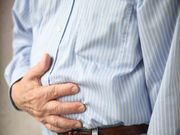Nearly 18 percent have recurrence requiring long-term medication, secondary surgery
WEDNESDAY, Sept. 13, 2017 (HealthDay News) — Laparoscopic antireflux surgery is associated with a relatively high rate of recurrent gastroesophageal reflux disease, according to a study published in the Sept. 12 issue of the Journal of the American Medical Association.
John Maret-Ouda, M.D., from the Karolinska University Hospital in Stockholm, and colleagues analyzed data from the Swedish Patient Registry to identify 2,655 patients who underwent laparoscopic antireflux surgery. Records were linked to the Swedish Causes of Death Registry and Prescribed Drug Registry.
The researchers found that over a median of 5.6 years, 17.7 percent of patients had reflux recurrence, 83.6 percent received long-term antireflux medication, and 16.4 percent underwent secondary antireflux surgery. Female sex (hazard ratio [HR], 1.57; 95 percent confidence interval [CI], 1.29 to 1.90), older age (HR, 1.41; 95 percent CI, 1.10 to 1.81), and comorbidity (HR, 1.36; 95 percent CI, 1.13 to 1.65) were risk factors for reflux recurrence. Recurrence risk was not tied to hospital volume of antireflux surgery (HR, 1.09 [95 percent CI, 0.77 to 1.53] for hospital volume ≤24 surgeries versus hospitals with ≥76 surgeries).
“Laparoscopic antireflux surgery was associated with a relatively high rate of recurrent gastroesophageal reflux disease requiring treatment, diminishing some of the benefits of the operation,” the authors write.
Copyright © 2017 HealthDay. All rights reserved.








